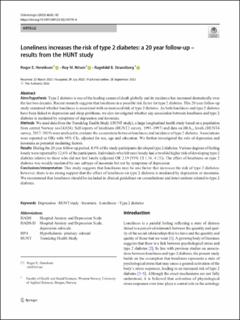| dc.contributor.author | Henriksen, Roger Ekeberg | |
| dc.contributor.author | Nilsen, Roy Miodini | |
| dc.contributor.author | Strandberg, Ragnhild Bjarkøy | |
| dc.date.accessioned | 2023-03-27T05:59:56Z | |
| dc.date.available | 2023-03-27T05:59:56Z | |
| dc.date.created | 2022-10-19T09:31:14Z | |
| dc.date.issued | 2022 | |
| dc.identifier.citation | Diabetologia. 2022, . | en_US |
| dc.identifier.issn | 0012-186X | |
| dc.identifier.uri | https://hdl.handle.net/11250/3060451 | |
| dc.description.abstract | Aims/hypothesis
Type 2 diabetes is one of the leading causes of death globally and its incidence has increased dramatically over the last two decades. Recent research suggests that loneliness is a possible risk factor for type 2 diabetes. This 20 year follow-up study examined whether loneliness is associated with an increased risk of type 2 diabetes. As both loneliness and type 2 diabetes have been linked to depression and sleep problems, we also investigated whether any association between loneliness and type 2 diabetes is mediated by symptoms of depression and insomnia.
Methods
We used data from the Trøndelag Health Study (HUNT study), a large longitudinal health study based on a population from central Norway (n=24,024). Self-reports of loneliness (HUNT2 survey, 1995–1997) and data on HbA1c levels (HUNT4 survey, 2017–2019) were analysed to evaluate the associations between loneliness and incidence of type 2 diabetes. Associations were reported as ORs with 95% CIs, adjusted for sex, age and education. We further investigated the role of depression and insomnia as potential mediating factors.
Results
During the 20 year follow-up period, 4.9% of the study participants developed type 2 diabetes. Various degrees of feeling lonely were reported by 12.6% of the participants. Individuals who felt most lonely had a twofold higher risk of developing type 2 diabetes relative to those who did not feel lonely (adjusted OR 2.19 [95% CI 1.16, 4.15]). The effect of loneliness on type 2 diabetes was weakly mediated by one subtype of insomnia but not by symptoms of depression.
Conclusions/interpretation
This study suggests that loneliness may be one factor that increases the risk of type 2 diabetes; however, there is no strong support that the effect of loneliness on type 2 diabetes is mediated by depression or insomnia. We recommend that loneliness should be included in clinical guidelines on consultations and interventions related to type 2 diabetes. | en_US |
| dc.language.iso | eng | en_US |
| dc.publisher | Springer | en_US |
| dc.rights | Navngivelse 4.0 Internasjonal | * |
| dc.rights.uri | http://creativecommons.org/licenses/by/4.0/deed.no | * |
| dc.title | Loneliness increases the risk of type 2 diabetes: a 20 year follow-up – results from the HUNT study | en_US |
| dc.type | Peer reviewed | en_US |
| dc.type | Journal article | en_US |
| dc.description.version | publishedVersion | en_US |
| dc.rights.holder | © The Author(s) 2022 | en_US |
| dc.source.pagenumber | 82-92 | en_US |
| dc.source.journal | Diabetologia | en_US |
| dc.identifier.doi | 10.1007/s00125-022-05791-6 | |
| dc.identifier.cristin | 2062596 | |
| cristin.ispublished | true | |
| cristin.fulltext | original | |
| cristin.qualitycode | 2 | |

